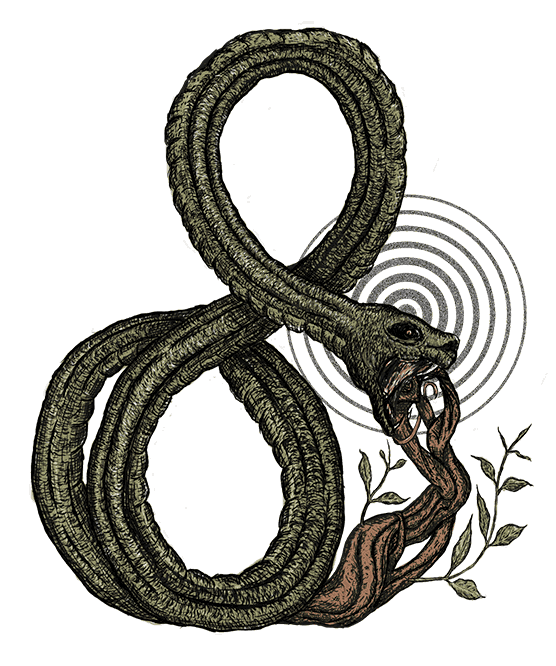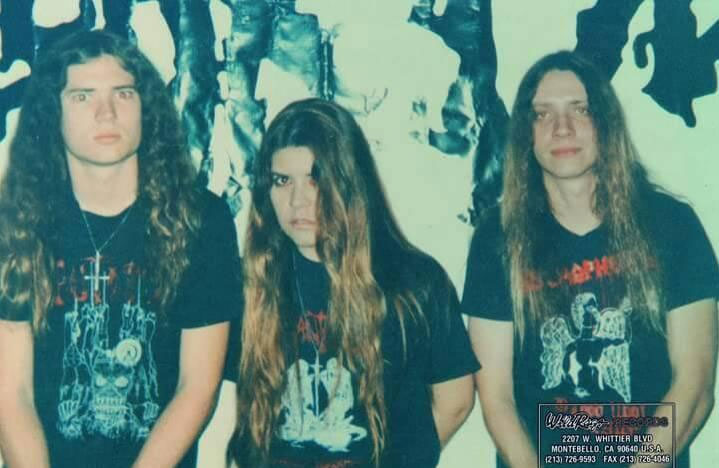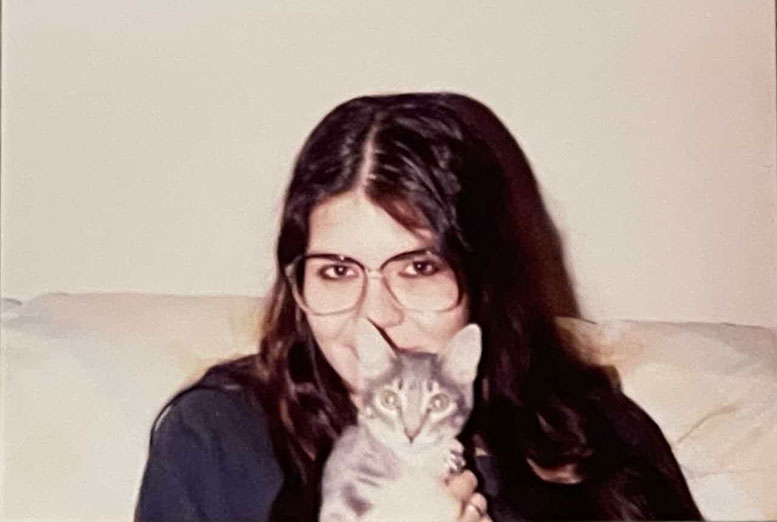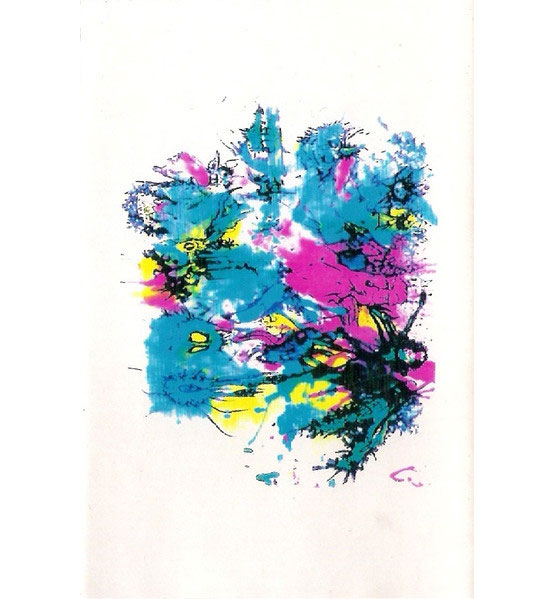Nuclear Death VI
2025-07-24
by Niklas Göransson
Self-funded, self-released, and nearly lost to time, All Creatures Great and Eaten marked Nuclear Death’s most ambitious vision yet. What began as rupture became rebirth, as Lori Bravo summoned a new identity from the wreckage of her past.

LORI BRAVO: Music has always been the most important thing in my life. If you no longer excite or inspire me musically – bye. Phil was losing his edge, and I could feel myself growing tired of the whole situation. I knew he had to go.
During the fall of 1992, as NUCLEAR DEATH finished up their third album, long-time guitarist Phil Hampson left the band.
In a 2020 interview with Coffin Nail Productions, Hampson attributed his departure to artistic disagreements and escalating personal tensions between himself, Lori Bravo, and drummer Steve Cowan: ‘One week they’re listening exclusively to Alice Cooper, the next it’s PINK FLOYD, then Janis Joplin or whatever.’
LORI: <laughs> He’s right! I opened Steve’s mind after he joined the band. Here’s this nineteen-year-old stoner kid – next thing you know, he’s experimenting with makeup, channelling early Alice Cooper. He looked like a doll; not feminine exactly, but that glam-rock androgynous beauty.
In fairness to Phil, he’s probably not alone among death metal musicians to resist glam influences.
LORI: I wasn’t about to turn NUCLEAR DEATH into a glam act – that would’ve been ridiculous. But outside the band, Steve and I were thrifting like crazy, buying all sorts of weird clothes. It also helped him realise he could explore his effeminate side without compromising anything.
Another curious mention was that Lori and Steve ‘started shaving their body hair and drinking blood’.
LORI: See, I’m a vampire at heart, and I’d always fantasised about that kind of thing with Phil, but he refused. When I was on my period, Phil saw me as the dirtiest, most disgusting bitch imaginable. Steve, on the other hand, was a virgin when we met and had none of those hang-ups. He’d just say, ‘Oh, you’re menstruating? Let’s go!’
Dare I ask about the shaving?
LORI: Steve didn’t have much body hair to begin with, but I’ve always preferred clean-shaven men. I want my guys on the effeminate side – slim, visible hipbones, high cheekbones. But honestly, I’ll give Phil credit. I appreciate that he didn’t mention the core reason: our breakup.
You think he would’ve stayed otherwise?
LORI: Oh, for sure. Instead, the fates stepped in and made sure I took my rightful place. I dumped him and moved in with Steve – there’s no way Phil could’ve stuck around afterwards. He was too busy being a dick to notice, but when I packed up my shit, I grabbed this big trunk we had, full of NUCLEAR DEATH memorabilia: lyrics, flyers, artwork, recordings. I took everything. That’s my legacy.
In the same Coffin Nail interview, Phil mentioned that he’d intended to leave NUCLEAR DEATH for some time, but Richard C of Wild Rags convinced him to stay – allegedly promising a European tour with AUTOPSY to promote the third album.
LORI: Yeah, Chris Reifert had already tried to get NUCLEAR DEATH on one of AUTOPSY’s tours overseas, but it never happened. Then Richard came in, promising – as he often did – to set it up for us. Of course, he failed to deliver.
How did Richard C react when he learned that Phil was out?
LORI: He didn’t – because by then I’d already severed ties with him and vowed to self-release. That’s why, when Phil called Wild Rags and said, ‘Hey, Joel and I wanna get a new singer and record the third NUCLEAR DEATH album without Lori’, Richard apparently agreed to sign them. I was genuinely excited. I thought we’d end up as rivals: whose record would be better?
After Phil’s departure, Lori and Steve resumed work on the third NUCLEAR DEATH album, which they decided should be titled “All Creatures Great and Eaten”.
LORI: I always loved the book and film All Creatures Great and Small. By that point, Steve and I had both gone vegan – he went first, and I followed. So, I suggested, ‘Let’s call it “All Creatures Great and Eaten”… because we don’t eat them!’ It cracked us up. That was our sense of humour.
At first, the duo considered bringing in a guitarist to replace Phil.
LORI: We tried out some friend of Steve’s – can’t remember his name now, but he even bought the exact same guitar Phil had, made sure it matched and everything. But he couldn’t figure out the NUCLEAR DEATH picking style, so I knew immediately it wasn’t gonna work. ‘Yeah, we’ll get back to you. Bye, Felicia.’
Couldn’t you have shown him?
LORI: You know, that’s exactly what he said. I told him, ‘Look, obviously I could show you if I wanted to – but I have neither the time nor the will. If you can’t learn it on your own, tough shit.’ I’m a terrible teacher, by the way; zero patience with people.
I’d never have guessed.
LORI: <laughs> I come from a whole family of teachers – my mom was one, as is my brother. Both excellent tutors, with saintly patience. I’m more like, ‘Fucking hell, are you retarded?’ I tried giving guitar lessons for money a few times, but I learned so quickly myself that I can’t relate to people who take longer. I just don’t understand waiting.
As a child, Lori bypassed formal guitar instruction, favouring instinct and obsession over method. Inspired by live footage of Jimi Hendrix and KISS, she taught herself entirely by ear – humming melodies, mapping notes onto homemade fretboard diagrams, and drilling riffs relentlessly until she matched the recordings.
LORI: Steve told me, ‘This is stupid. You should just play guitar; you’re better than Phil anyway.’ I asked, ‘How the fuck would you know?’ He goes, ‘Because you are.’ And he was right. Phil had spent years pushing me aside, crushing my confidence – I didn’t believe in myself as a guitarist anymore. But once I finally picked it back up…I blew his ass out of the water.
Listening to rehearsal recordings of the new material, Lori figured out the riffs entirely by ear.
LORI: I don’t learn by watching. Whenever someone tries to show me how to play something, I just can’t pick it up that way. If I wanted to replace the keyboard in my MacBook, sure – I’ll check out a YouTube video and follow along. But music? I must hear it. Within two days, I had all the songs down, no problem.
Following Lori’s breakup with Phil, the new couple moved into a house originally built for Steve’s brother and his wife on their parents’ property.
LORI: After they divorced, the house stood empty and half-finished. Steve’s dad helped us fix it up – we redid the whole place and turned it into a real home. Once we moved in, Steve and I set up an eight-track amateur recording studio. His parents were incredibly supportive and never made us pay for anything.
What were you doing for work?
LORI: Around that time, I finally got disability for spina bifida. My dad said, ‘You shouldn’t have to work anymore.’ Initially, I was like, ‘What?!’ But then it hit me – I’d be free to focus on what I really wanted to do. So, I went through the process. In the meantime, Steve supported us with phone work, odd jobs, whatever.
Treading the path staked out by “…For Our Dead…”, “All Creatures Great and Eaten” brought NUCLEAR DEATH deeper into sludgier and more atmospheric territory. “Aunt Farm” especially stands out, with its droning, doom-laden passages.
LORI: One of my favourites is “Divine Perversion”. I thought, ‘Hey, I should try speaking in tongues.’ I love the soundtrack for The Omen. Terrifying. That Latin chanting? Absolutely haunting, so I borrowed the idea. I wanted it to sound like I was summoning something. The song already had such a sinister, scary vibe – why not lean into it?
The lyrics are as delightfully demented as one would expect from a NUCLEAR DEATH record. Lori has mentioned “Guinea Man” as one of the most disturbing lyrics in their catalogue, written by Phil and based on his fear of being sold to science after death.
LORI: It came from those newspaper ads you’d see back in the day: ‘We’re looking for volunteers to participate in a drug trial. Here’s what you’ll get paid.’ I don’t know if he was exactly afraid – more like, we were barely scraping by and certainly not making any money off our music. Phil’s idea grew from that reality: ‘What if…?’
Using their home recording setup, the pair demoed the new material. Along with a bundle of handwritten notes, this pre-production archive became known as ‘the Bible’ – meticulously arranged, mapped out, and finalised ahead of time to avoid wasting studio hours.
LORI: It wasn’t religious or anything, just methodical. We wrote everything down: album title, track order, what needed to be done – all of it. Steve went, ‘Damn! You’re one organised bitch, Lori.’ And he was right. I’m the ultimate house leader: whore in the bedroom, cook in the kitchen, maid in the house. Suzy fucking Homemaker, badass edition.
Did you consider bringing in a dedicated bass player?
LORI: No, we decided to split bass duties; that’s why the record sounds better – because it wasn’t just me. Steve understands drums and stringed instruments, so he could incorporate ideas I’d never think of. He knew how to make parts more dynamic, especially in relation to his own drumming.
Where Lori approached bass from a guitarist’s perspective – focused on melody, feel, and movement across the strings – Steve had a drummer’s mindset. He thought rhythm-first: locking in with the kick, accenting snare hits, and weaving the low end directly into the song’s pulse.
LORI: Don’t ask me who played on which sections; I honestly don’t remember. If Steve had an idea that fit better rhythmically, he’d say, ‘Let me lay this down here.’ Keep in mind, bass wasn’t my first love – guitar was. Now, finally back in my element, I wanted to push things further.
How different do you think the album would’ve sounded if Phil had still been involved?
LORI: Honestly? I doubt it would’ve sounded much different at all. Steve and I didn’t alter any of the material we composed before Phil left. Then Steve wrote “Bones of the Lip”, and I had this riff in my head that became the title track – just to prove I could do it.
Lori’s contribution, which closes “All Creatures Great and Eaten”, is divided up into two tracks, with the latter part serving as an unlisted outro.
LORI: I don’t remember which album gave me the idea, but one of them had a hidden track that played if you left it running long enough. We thought, ‘Wouldn’t it be cool to add something at the end?’ That’s when I wrote the closing piece, unknowingly laying the groundwork for our future magnum opus.
In October 1992, Lori and Steve entered Chaton Recordings in Scottsdale, Arizona, to record “All Creatures Great and Eaten”. This time, they had five full days at their disposal – significantly more than on earlier albums. Without label backing, Lori and Steve financed it themselves.
LORI: Gorgeous studio. We stuck to the Bible, and everything just clicked. I don’t recall any problems at all. Steven Escallier, our engineer, understood exactly what we were aiming for, which is why it sounds so great. No complaints – nothing I’d change.
The following month, Cats’ Meow Records – Lori and Steve’s label – released “All Creatures Great and Eaten”, self-distributed and only on cassette. From what I’ve gathered, the reason it never made it onto CD was the hefty studio bill.
LORI: Yeah, cassettes were the cheapest option. The great thing about working with Steve – him being younger, and me still clueless about business – was that we’d do whatever we wanted without overthinking anything. It didn’t matter if nobody bought “All Creatures…”; Steve and I made it because we could.
I can’t quite wrap my head around this cover artwork.
LORI: I made it using Kool-Aid. Steve and I were so broke after the studio that we couldn’t even afford paint. I was like, ‘No more monochrome – we’re doing full colour. I want something so bright and sickly it nauseates you, hiding the darkest, most demented music inside.’
What kind of promotional strategy had you developed?
LORI: None. I just went back to what I’d always done: mailing tapes out to every ‘zine I could think of, trying to let people know the album existed. Of course, we sent review copies to Kerrang!, Metal Hammer, and the bigger magazines, but I doubt they ever even looked at it.
log in to keep reading
The second half of this article is reserved for subscribers of the Bardo Methodology online archive. To keep reading, sign up or log in below.







